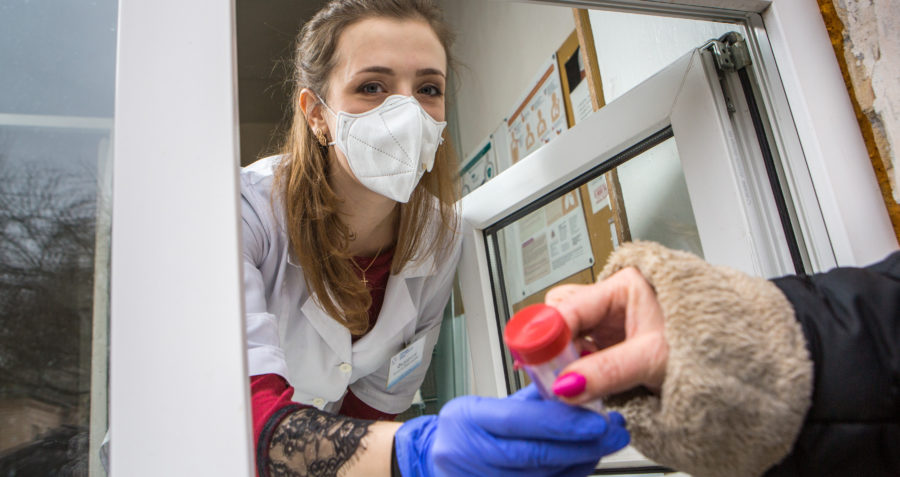Urgent action needed on TB and HIV to curb impact of COVID-19
 © Natalia Kravchuk, Alliance for Public Health
© Natalia Kravchuk, Alliance for Public Health
The COVID-19 pandemic and its restrictive measures are negatively impacting the testing and treatment of millions of people living with TB and HIV co-infection. The World Health Organization estimates an additional 400,000 lives could be lost.
On World Tuberculosis Day (24 March) we remember that every single day 4,000 people die and 27,000 people get sick with tuberculosis (TB).
The clock is ticking faster than ever before for governments to step up and fulfill global commitments on TB. This includes getting preventive treatment to six million people living with HIV who are most at risk of TB by 2022.
So, what can be done? Through our work in Ukraine and policy engagements globally, we’ve been looking at how to sustain the response to HIV and TB. We want to avoid the worst-case scenario where decades of progress are lost because of COVID-19.
Undetected TB, mental health and economic hardships
In Ukraine since the start of the pandemic, we’ve seen increased coordination among government and civil society stakeholders to undertake decisive actions to address COVID-19. But, uptake of diagnosis and treatment for people affected by HIV and TB has declined. And the attention of the healthcare system shifted to COVID-19.
Now Ukraine is struggling to find new cases of active TB, similar to other countries with a high TB burden, resulting in 30% fewer new TB cases found compared to 2020. People avoid going to clinics and are reluctant to test because of COVID-19 risks. In response, Frontline AIDS’ partner Alliance for Public Health in Ukraine, together with regional partners, is reaching out directly to key populations affected by TB to provide testing and diagnosis.
These populations groups, often already marginalised by society, are being hardest hit by economic hardships and mobility restrictions related to COVID-19. Many have lost their income, livelihoods, and social support networks. Mental health problems, low motivation to adhere to treatment and lack of financial resources for fortified supplementary nutrition have led to increased levels of treatment failure.
Psychosocial support for people with TB and HIV
Responding to these challenges in the context of the pandemic, Alliance for Public Health in Ukraine and partners have significantly increased the focus of services on psychosocial support for people with TB and HIV co-infection. This is particularly to support adherence to treatment. They have adopted an innovative approach to address mobility restrictions by offering TB services online, including video observed treatment, counselling, training and monitoring.
These approaches are helping but they need to be scaled up and it is essential that governments and donors increase political and financial support to community-led organisations.
COVID-19, TB and HIV co-infection
The COVID-19 situation in Ukraine is dire with new cases growing exponentially, no vaccines available, and low access to rapid diagnostics testing.
Addressing this situation is essential for sustaining the TB and HIV responses, particularly among marginalised populations. While experience of COVID-19 infection in TB patients remains limited, it is anticipated that people with both diseases will have poorer treatment outcomes, especially if TB treatment is interrupted. Worldwide, as well as in Ukraine, healthcare workers are still learning how to treat TB patients with COVID-19 co-infection.
The situation is complicated in Ukraine as not all employers follow quarantine policies due to economic hardships. Many people with mild symptoms are unaware of their COVID-19 status. The bottom line is that we do not know how many COVID-19 cases there are, or whether it is the cause of lung disease complications that people develop. Though limited vaccinations have just started for the elderly and medical professionals, it will take years to roll out and while this happens it is essential to have more access to rapid diagnostics.
In addition to vaccines, COVID-19 testing and treatment is essential
Every TB patient should have access to a COVID-19 rapid test, but this is not happening in Ukraine. PCR diagnostics tests are done on referral but these tests are more expensive, lengthy, and less client-friendly, and people are not proactively seeking the tests.
Testing is key to equitable distribution of vaccines and is a necessary first step to a successful test-and-treat strategy. As part of our Global Fund programmes, Alliance for Public Health in Ukraine is making rapid tests available for frontline medical personnel and NGO staff who are working directly with marginalised people affected by HIV and TB.
But a more robust test-and-treat strategy is urgently needed at country level with testing done at the primary health care and community level. We are urging the Ukraine government to strengthen the national COVID-19 response without burdening TB, HIV, and other public health services, by sustaining support for these programmes. It must also increase awareness about the importance of testing to help identify COVID-19 cases at the early stage and prevent deaths.
Trailblazing the way forward
Alliance for Public Health is working in a broad coalition of partners to advocate and lobby the government for integrated services so that marginalised people can receive treatment, care, and support for TB, HIV and hepatitis C co-infection, as well as COVID-19 at one point of care. This is more important than ever before.
Decriminasliation of key population groups, particularly people who use drugs, also remains high on our agenda.
We hope the COVID-19 crisis will motivate the government of Ukraine, and other governments, to develop and implement policies in relation to such key populations that are more evidence-based and public health-focused.
Zahedul Islam is director of treatment, procurement and supply management at Alliance for Public Health in Ukraine and a member of the ACT accelerator diagnostics pillar.
Olya Golichenko is policy lead at Frontline AIDS and a member of the developed country civil society delegation of the Stop TB Partnership.
Further Reading
Tags
DecriminalisationHarm reductionHIV preventionPeople who use drugsTuberculosis (TB)





